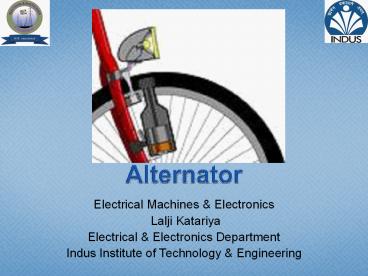Alternator - PowerPoint PPT Presentation
Title: Alternator
1
Alternator
- Electrical Machines Electronics
- Lalji Katariya
- Electrical Electronics Department
- Indus Institute of Technology Engineering
2
EMF Generation
- In 1930,Farady discovered,
- EMF df/dt
3
EMF Generation
- But applicable only when Magnetic circuit is same
at all points. - So not possible to apply in rotating machines.
- Can be express as constant magnetic
field(Density) B relative velocity v of field
and conductor of length l moving through it for - EMF Blv
4
EMF Generation
- In one conductor
- Generated EMF Blvsin? volts
- In coil
- Generated EMF 2Blvsin? volts
- In N number of coil
- Generated EMF 2NBlvsin? volts
5
EMF Generation
6
Direction of Induced EMF
- Direction of Induced EMF by
- Flemings right hand rule.
7
Generation of EMF
- Conductor / Coil
- Flux / magnetic field
8
Making of Coil / Armature
9
Coil / Armature
10
Development of Field
- Magnetic field developed by magnetic coil.
11
Main Parts
- Stator Armature
- Rotor Field
12
Stator
- Stationary armature
- Coils is placed in slots of stator core.
- Stator is made of laminates.
- Whole stator is fixed in the frame.
13
Rotor
- Field winding
- External D.C.supply of 120-600 volt
- Supply by Brush Slip ring
- N pole S pole developed alternatively
14
Rotor
- Cylindrical Type
- Small diameter
- Large axial length
- High speed
- Used at Steam turbine motors.
- Salient Pole Type
- Large diameter
- Small axial length
- Low speed
- Used at water turbines IC engines.
15
Excitation system
- Flux distribution
- Recently, Brushless excitation system used.
16
Difference between A.C. D.C. Generator
- In D.C. Generator
- Armature--Rotating
- Field -- Stationary
17
Difference between A.C. D.C. Generator
- In A.C. Generator
- Armature--Stationary
- Field -- Rotating
18
Advantages of Alternator over D.C.Generator
- Generation of power at High level.
- Easy to collect High current.
- No commutation.
- Easy to provide Insulation Cooling in
stationary armature. - Low voltage level in field so less insulation
required.
19
Electrical Mechanical Degree
360 mechanical
360 mechanical
For 2 pole 1 electrical cycle1 mechanical cycle
For 4 pole 2 electrical cycle1 mechanical cycle
360 mechanical 360 x (P/2) electrical 1
mechanical cycle (P/2) electrical cycle
20
Induce EMF Frequency
- 1 Mechanical Revolution P/2 cycle of EMF
- P/2 cycles/revolution
- For N rpm, (N/60) revolutions/sec
- Frequency cycles/sec f
- f (cycles/revolution)x (revolution/sec)
- ( P/2) x (N/60) Hz
- (PN/120) Hz
- For 50 Hz
P 2 4 8 12
N 3000 1500 750 500
21
EMF Equation
- For one conductor
- Induced EMF/revolution dø/dt volt
- (P x ø)/ (60/N) volt
- 2fø volt
- For Coil, EMF/revolution 4fø volt
- Average EMF/phase (Turn/phase)x 4fø volt
- 4føTPH volt
- R.M.S. value of EMF Form Factor x Avg EMF
- 1.11 x 4føTPH volt
22
Types of Windings
- Single layer Double Layer
- Full pitch Short pitch winding
23
Types of windings
- Concentrated Distributed winging.
- In Concentrated Winding
- all the conductor of coil in 1 slot
- In Distributed winding
- all the conductor of coil in more than 1 slots
24
Pitch Factor/ Coil Span Factor Kc
- Kc factor by which EMF get reduced due to
short pitch - a short pitch angle
- Coil is shorted by angle a
- Kc COS(a/2)
1800
a
1800 -a
25
Distribution Factor Kd
- Kd factor by which EMF get reduced dut to
distributed winding. - n slots / pole
- m slot / pole / phese
- Slot angle ß 180/ n
- Kd sin(mß/2)
- m sin(ß/2)
26
Generalized EMF equation
- For full pitch concentrated winding
- EPH 4.44 føTPH volt
- For short pitch distributed winding
- EPH 4.44 Kc Kd f ø TPH volt
27
Voltage drop in Induced EMF
- Due to following resistance
- 1.Armature resistance Ra
- 2.Armature leakage reactance Xl
- 3.Armature reaction Xa
28
Voltage drop in Induced EMF
- 1.Armature resistance Ra
- Resistance offered by the armature winding
- In star connection, In delta connection
29
Voltage drop in Induced EMF
- 2.Armature leakage reactance Xl
- Armature flux develop by current carrying
conductor - Armature Flux not cross air-gap but takes
different paths and makes the winding inductive.
30
Voltage drop in Induced EMF
- 3.Armature reaction Xa
31
Voltage drop in Induced EMF
- 3.Armature reaction Xa
- Effect of armature flux on the main field flux on
loading condition. - For Unity p.f.
- cross magnetizing effect
- For zero p.f. lagging
- demagnetizing effect
- For zero p.f. leading
- magnetizing effect
32
Synchronous reactance
- Xs Xl Xa
- Total voltage drop
- IRa jIXs
- I (Ra jXs )
- I Zs
- Zs Synchronous
- Impedance
- Due to Zs , No load voltage E0 reduced to
terminal voltage V for lagging p.f.
33
Voltage Regulation
- regulation E0 - V x 100
- V
34
Parallel operation
- To full fill new increased load ,
- two alternators connected in parallel with bus
bar. - In this process, new running alternator is
connected to bus bar by matching frequency V by
synchroscope. - This process called Synchronization.
- Another methods- 1. Dark Lamp Method
- 2. Bright Lamp Method.
35
Condition for Synchronization
- following parameter should be same for incoming
alternator bus bar - Terminal voltage
- Frequency
- Phase sequence
36
Any Question? Thanks































